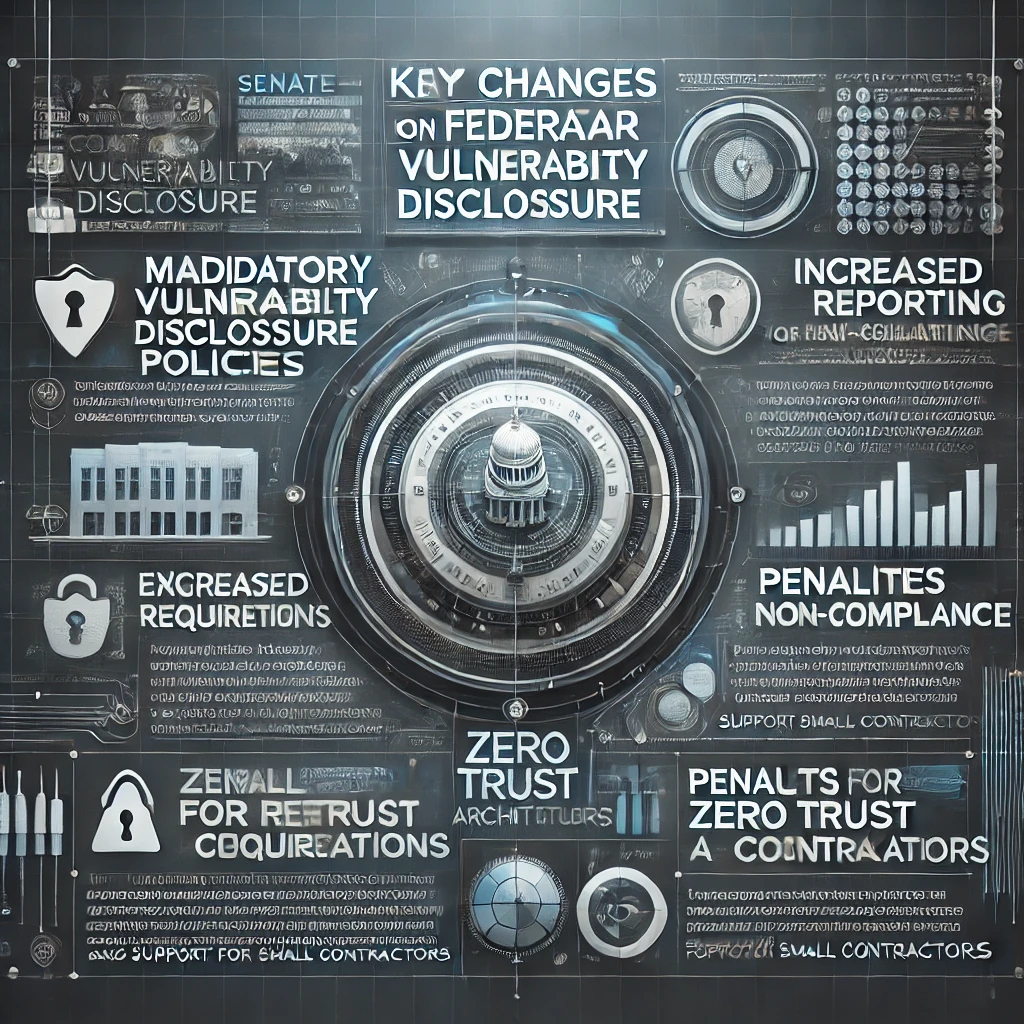Introduction to Federal Contractor Vulnerability Disclosure
In today’s rapidly evolving digital environment, cybersecurity has become a critical concern, especially within federal systems where the stakes are incredibly high. The key phrase “federal contractor vulnerability disclosure” emphasizes the growing need for strong security measures among federal contractors. Recently, a new Senate bill was introduced that aims to strengthen thefoundation of zero-trust architecturesand enhance data privacy withinfederal agencies by enforcing strict vulnerability disclosure policies. The bill is designed to strengthen cybersecurity defenses by ensuring that potential weaknesses are identified and mitigated before they can be exploited. In this blog post, we’ll explore the key changes proposed by this Senate bill, the implications for federal contractors, and the future landscape of cybersecurity regulation.
What’s new in the Federal Contractor Vulnerability Disclosure?
The new Senate bill introduced by Senators Warner and Rubio is a significant step forward in the cybersecurity space. The bill would require all federal contractors to implement a comprehensive vulnerability disclosure policy, an important step toward amore resilient Zero Trust architecture.

Latest developments
| Date. | Events | Impact |
|---|---|---|
| August 2024 | Senate Introduces Bill to Require Federal Contractor Vulnerability Disclosure | Establishes new compliance requirements for contractors to strengthen national cybersecurity defenses. |
| July 2024 | Federal agency audits reveal gaps in contractors’ cybersecurity practices. | Highlight the need for a standardized vulnerability disclosure policy. |
| June 2024 | Cybersecurity firms have reported an increase in attacks targeting federal contractors. | Raises the urgency of legislative action to protect sensitive government data. |
| May 2024 | White House issues executive order focusing on improving federal supply chain cybersecurity | Laying the groundwork for more comprehensive federal cybersecurity regulations |
These developments underscore the urgency of implementing a robust Zero Trust architecture across federal systems. This legislation seeks to protect data privacyand maintain the integrity of federal government operations by ensuring that vulnerabilities are promptly disclosed and remediated.
Key changes you should know about
The Senate bill on federal contractor vulnerability disclosure introduces several key changes that will have a significant impact on how contractors manage and report security vulnerabilities. These changes are designed to be consistent with cybersecurity and zero-trust architecture principles, ensuring that data privacy isprioritized in all federal operations.

1. mandatory vulnerability disclosure policy
One of the most important aspects of the new legislation is requiring all federal contractors to implement mandatory vulnerability disclosure policies. These policies must outline how contractors identify, report, and mitigate vulnerabilities within their systems. This change ensures that data privacyis protected at all levels of the supply chain by adhering to Zero Trust Architecture principles.
2. increased reporting requirements
The new legislation requires federal contractors to report vulnerabilities not only to their internal security teams, but also to the relevant federal agencies. This increased reporting will provide the government with a comprehensive overview of potential threats, ensuring that cybersecurity measures arestrengthened and data privacyis maintained.
3. penalties for non-compliance
To enforce these new requirements, the Senate bill introduces significant penalties for contractors who fail to comply with vulnerability disclosure policies. Failure to comply could result in fines, loss of federal contracts, or other legal action. These penalties are a clear signal that the government is committing to a higher level of cybersecurity, including data privacy, across federal systems.
4. Support for small contractors
Recognizing that small contractors may struggle to meet these new regulations, the bill also includes provisions for federal assistance. Consistent with theprinciples of Zero Trust Architecture,this assistance can come in the form of grants, training programs, or access to advanced cybersecurity tools. With this support, small businesses can meet the new requirements without compromising data privacy.
What’s next?

Looking ahead, the Senate bill on federal contractor vulnerability disclosure is likely to pass with strong bipartisan support. The urgency to strengthen cybersecurity measures in the federal supply chain has never been greater, especially as the principles of Zero Trust Architectureare more widely adopted. If enacted, the bill will likely trigger a period of adjustment as contractors work to implement the necessary policies and procedures.
In the long term, the bill could set a precedent for broader cybersecurity regulation across a variety of sectors, particularly those critical to national security. Contractors should begin preparing now by reviewing their current practices and identifying gaps that need to be addressed to comply with the new requirements. As the legislative process moves forward, it will be important to stay informed of further developments and potential amendments to the bill.
Conclusion
The introduction of a Senate bill focused on federal contractor vulnerability disclosure is an important milestone in the ongoing effort to strengthen national cybersecurity. By requiring all federal contractors to adopt a standardized vulnerability disclosure policy, the bill aims to reinforce the principles of a zero-trust architectureby identifying and quickly remediating potential vulnerabilities. As the bill moves through the legislative process, contractors should take proactive steps to align their practices with these new requirements. The future of data privacy and cybersecurity within the federal supply chain depends on the successful implementation of these regulations, so it is imperative that all stakeholders remain informed and prepared.
Key takeaways
- The Senate bill would require federal contractors to adopt a standardized vulnerability disclosure policy aligned with a Zero Trust architecture.
- Increased reporting requirements ensure that vulnerabilities are reported internally and to federal agencies, increasing cybersecurity.
- Failure to comply can result in significant penalties, emphasizing the importance of data privacy.
- Includes provisions to help small contractors meet new cybersecurity requirements.
- The bill is expected to pass with bipartisan support and could set a precedent for future cybersecurity regulations.
See also
- CyberScoop. (2024). Federal Contractor Vulnerability Disclosure Policies: New Senate Bill Explained. Retrieved from https://cyberscoop.com/federal-contractor-vulnerability-disclosure-policies-senate-bil/
- The Hill. (2024). Senate Introduces Bill to Strengthen Federal Contractor Cybersecurity. Retrieved from https://thehill.com/senate-bill-cybersecurity-federal-contractors
- Reuters. (2024). New Senate Bill Targets Cybersecurity Gaps in Federal Contracting. Retrieved from https://reuters.com/senate-bill-federal-cybersecurity-gaps
- TechCrunch. (2024). Federal Contractors to Face New Cybersecurity Mandates Under Senate Bill. Retrieved from https://techcrunch.com/federal-contractors-new-cybersecurity-mandates
- YouTube. (2024). Senate Bill on Federal Contractor Cybersecurity: What You Need to Know. [Video]. Retrieved from https://www.youtube.com/watch?v=abc987654
